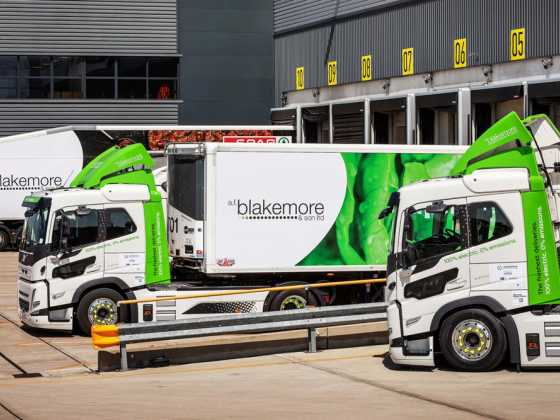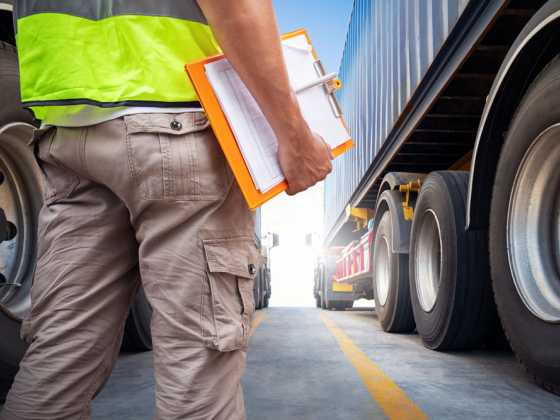Expert Panel: Logistics and Commercial Vehicles

Commercial vehicle operators have kept essential supplies flowing during the coronavirus pandemic. Our expert panelists Stuart Thomas from the AA, Natalie Chapman from FTA, and Andy Eastlake from LowCVP discuss what recognition and support the logistics industry should receive, especially when it comes to economic recovery and carbon reduction targets
The government’s COVID-19 response plans categorises logistics professionals as “key workers”. While many businesses have been able to work from home, the logistics industry has been working tirelessly to enable the country to function, whether that’s replenishing food stocks at supermarkets, or delivery vital medicine and protective gear to the frontline. This highlights how vitally important the transport and logistics sector is.
“Commercial vehicle operators, their drivers and support staff have shown what a vital role they play in keeping food and other essential supplies flowing to where they’re needed,” comments Andy Eastlake, LowCVP’s managing director.
“We all owe them a debt of gratitude for doing this in such challenging circumstances. We often refer to the logistic sector as the ‘life blood’ of the economy and in the lockdown it certainly has been. The charts of transport sectors in the daily briefing show how even when everybody stays at home, the HGV fleet keeps on trucking.”
Put simply, life as we know it wouldn’t be able to function without the logistics and transport industry. Given their vital role, should the government give the industry more recognition or support?
Natalie Chapman, head of urban policy at the FTA believes that commercial vehicle drivers deserve to have a decent working environment which includes access to welfare facilities and safe, secure places to park their vehicles. Natalie explains: “For several years, FTA has been campaigning for driver facilities to improve, and in response, we have received empty promises from government; it is now time to show real leadership and deliver the provisions these workers deserve.
“And while we were disappointed to see the needs of logistics were not considered in the government’s plans to reallocate road space for active travel, the government has supported logistics in many other ways during the pandemic, such as postponing Clean Air Zones. We want to see government take into consideration the needs of logistics when developing policies; we have seen improvements in this area and hope that with continued campaigning from FTA, this will become a long-term trend.”
Stuart Thomas from the AA adds: “It comes as no surprise to those of us in the transport and technology sectors that commercial fleets provide a key backbone to the UK economy. We have long-standing relationships with the Freight Transport Association/Logistics UK, as well as British Chambers of Commerce and many professional trade bodies, from grocers to utility support services. We have also recently teamed up with the Association of Independent Professionals and the Self Employed, IPSE, to provide cost-effective access to breakdown services for our essential SMEs.
“We expect there will be ongoing tweaks to policy over the coming months and years as Government looks to support business and the economy to establish a new stability. We hope, within those changes, that the essential role of businesses operating commercial vehicles – and their drivers – is recognised as part of ongoing policymaking.”
Clean Air Zones
The COVID-19 crisis has led the government to delay the implementation of Clean Air Zones (CAZs) across the country so local councils could focus on the pandemic response.
Clean Air Zones aim to deter the most polluting vehicles from entering towns and cities with poor air quality to clean up air pollution.
Will this delay of clean air measures be welcome news for commercial fleets?
Natalie believes the delay has meant that commercial fleet operators could focus on the crisis at hand, and urges the government to consider the financial impact the pandemic is having on businesses.
She says: “The postponement of Clean Air Zones (CAZ) is welcome news for commercial fleet operators; logistics businesses have been working tirelessly to support the UK during the pandemic and do not have the funding nor the resources to undertake the necessary vehicle upgrades, or alternatively, bear the charges of non-compliance at this time.
“The government must understand the heavy financial toll Covid-19 is having on the logistics sector; many companies are experiencing a serious downturn in business. The economic assessments carried out by government when evaluating the feasibility of charging CAZs is no longer valid; the economy shrank by two per cent in the first three months of 2020, according to the Office of National Statistics, and Chancellor Rishi Sunak is now warning of a significant recession. The government should revaluate whether introducing such an expensive scheme is affordable at this time of economic hardship, especially as CAZs will hit small businesses and specialist operators most – those who can least afford to pay.”
The administrative and operational difficulties that industry has been experiencing is also a concern for the FTA. Natalie says: “We are concerned about disruption to supplies of trucks and equipment; the industry needs more time to prepare for Clean Air Zones. At FTA, we will be working with local and national governments on the details of these schemes to best support industry going forward.”
Stuart Thomas believes that while the delay to clean air zones gives fleets “breathing space”, they should still be preparing for the future. He says: “The reality is we need policy consistency and certainty to allow businesses and fleets to invest in technology for the future. Commercial vehicles tend to stick around for a while, and have a strong second, third and even fourth-hand life in small and medium enterprises (SMEs). For us to see a difference in vehicle mix on the roads in five or even ten years time, the larger fleets will have to make their move to alternative fuels today.
“The delay of Clean Air Zones may provide a little more breathing space when it comes to making decisions about where investment should lie, but it should not prevent businesses trialling the options already on the market. There is further education required around the Whole Life Cost (WLC) equation; helping fleet managers and business owners to make informed decisions about their investment in new technology over the total course of its working life, not just considering the upfront investment.”
The experience of quieter streets and cleaner air during the pandemic lockdown has given people a taste of how different urban environments can be, so if anything, this may be likely to increase the pressure for clean air measures to be introduced, believes Andy Eastlake. He says: “The delay to CAZs may allow more time, so the range of ultra-low and zero emission vehicles available will be much greater and the options for retrofitting will cover more existing trucks and vans.
“There have been growing calls for the recovery from the crisis to be led by green initiatives, so the most enlightened fleets will grab this opportunity to set themselves up for the new expectations of what urban centres can be. LowCVP has a range of reports, tools and advice to help fleet managers who aren’t already compliant and we are already seeing growing interest in these.”
Alternative fuels
The focus of the government’s transport carbon reduction strategy arguably focuses on electrification. But for heavier goods vehicles, this is still generally not viable given the cargo and distances they cover. But many commercial vehicle operators have shown that there are alternative options available to green their operations.
Andy Eastlake said: “Pressure is growing fast for HGV fleets to cut their carbon footprints as well as reduce polluting emissions, but of course there are far fewer realistic options currently on the table. For most heavy operations, electrification is not yet an option. Renewable fuels produced to strict, verifiable environmental criteria, provide a realistic near-term alternative with significant carbon benefits.
“We are expecting the results of the DfT’s Low Emission Freight Trial (LEFT) to be presented in the summer, and we know that gas trucks running on fully certified biomethane have shown some dramatic results. LowCVP has recently published a Renewable Fuels Guide specifically aimed at commercial fleets which explains a range of options with facts, figures and case studies.”
LowCVP is also running a webinar on 28 May to explain the opportunities for the adoption of renewable fuels by HGV fleets.
Natalie Chapman says that FTA members are keen to transition to low emission vehicles as soon as possible, but they need direction and clarity from government on the right fuels and technologies to adopt. She explains: “We have been working with government to develop a definition of an Ultra-Low Emission Truck (ULET). This would incentivise manufacturers to invest more resources into developing these vehicles; testing new technology can be expensive but a ULET definition would provide clear parameters and stimulate demand. And with cities across the UK looking to go even further than the Euro VI requirements of CAZs, a clear definition would provide authorities with a criterion that can be applied consistently across the UK, preventing the patchwork of standards we are seeing emerge.”
“At FTA, we will continue to assist the government in developing a single, clear and workable definition for ultra-low emission truck and vans; we would also like to see clear guidelines apply to fuels,” adds Natalie.
Stuart Thomas comments: “Heavy goods vehicles continue to pose challenges for those looking to shift to alternative fuels, with minimal viable options on the market.
“However, we are excited about the various investments being made and look forward to supporting all the models which come to market, whatever approach to fuelling they choose to adopt.”
How will mobility change?
The coronavirus pandemic has shown that significantly reducing transport can have major benefits for the environment. Air quality has improved in cities across the globe, with London reporting drops of almost 50 per cent on its busiest roads. Data from Riccardo has shown that Oxford city centre has seen a historic 59 per cent drop in air pollution as a direct result of the coronavirus lockdown.
Can fleets continue this good momentum by thinking differently about mobility once the lock down is over?
Stuart Thomas believes this may be the time that people consider electric vehicles, as well as greener last mile options. He explains: “There may well be major changes to the way we travel post-lockdown, with a possible increase in smaller journeys leaving individuals and organisations considering whether electric vehicles may fit their needs. Some drivers who have appreciated lower traffic noise, fewer and shorter journeys, may be prompted to finally buy an electric vehicle.
“In any case, we would expect businesses and fleets to take the opportunity to consider which journeys are essential and think about how they can best meet their business objectives while supporting the onward push for improved air quality, reduced congestion and a more diverse urban mobility mix. This may also include consideration of micro mobility options for last mile delivery, particularly in city centres and densely populated areas.”
When looking at the reduced traffic situation, both Andy and Natalie point out that freight vehicles have largely been operational during the crisis.
Andy Eastlake says: “We must remember that the commercial vehicle sector has been operating throughout and that HGV traffic only dropped by around 40% (compared to buses and trains which are down around 90%) and is now up to almost 80% of ‘normal’.
“However, the situation does provide a major opportunity for long-term gains in terms of reduced pollution – and greenhouse gases and noise – if government and businesses adopt practices to lock-in some of the benefits. While virtual working will undoubtedly reduce people movement, your tomatoes, toiletries and timber all have to be physically moved. If fleets can now take an even more ambitious view on what vehicle they buy next and maximising every trip-load, together with helping customers choose more efficient (grouped) delivery options, we can accelerate the changes that were coming anyway, and deliver the economic recovery we now all need.”
Natalie Chapman says: “While the overall volume of traffic on our roads has declined since the lockdown, road freight activity has remained essential; businesses within the logistics sector have been working hard to deliver the food, medical supplies, and hygiene products the nation needs during the Covid-19 pandemic.
While this is necessary – and logistics businesses are committed to using the cleanest vehicles or method of transportation as possible – there is space for improvement in private travel.
“As such, I am pleased to see the government is encouraging active travel among members of the public by issuing guidance for councils to create additional road space for cyclists and pedestrians, helping to improve air quality while making social distancing easier. However, the FTA and its members are concerned the government has not included the needs of logistics within its plans. We have now written to Transport Minister Baroness Vere to request urgent clarification on several areas of the plans which are key to safe and efficient logistics movements throughout our cities, including access to kerbside for deliveries and servicing activity.”
Expert Panelists
Stuart Thomas, director of fleet and accident management, the AA
With more than 20 years’ experience in the fleet sector, Stuart’s extensive knowledge of the industry comes from roles across contract hire, disposal and related fleet services. His experience includes working with organisations including Nissan Finance and Lombard. In 2000, Stuart joined The Automobile Association (AA) and was promoted to the role of director of fleet services, where he is responsible for managing all aspects of the AA’s fleet and small-or-medisum sized (SME) clients. This includes some of the UK’s largest fleets and most diverse business users. In this role, Stuart delivers bespoke contracts and manages a team of more than 35 dedicated account managers, call handlers and sales personnel.
Andy Eastlake, managing director, LowCVP
Andy Eastlake has been managing director of the Low Carbon Vehicle Partnership since April 2012. He has a background in vehicle engineering, specialising in powertrain developments, fuel economy and emissions. Formerly at Millbrook Proving Ground, Andy led the work on powertrain test and development programmes and alternative fuels for a variety of global OEM customers.
Natalie Chapman, head of urban policy, FTA
Natalie Chapman is head of south of England and urban policy at FTA, the largest and most influential business organisation in the logistics sector. Natalie has been an integral part of FTA’s policy team for more than 15 years and campaigns on behalf of its 18,000 members. Her role includes developing relationships and undertaking lobbying activities with the main governmental, political and policy stakeholders. Her focuses include city centre issues, such as Clean Air Zones and out-of-hours deliveries.






